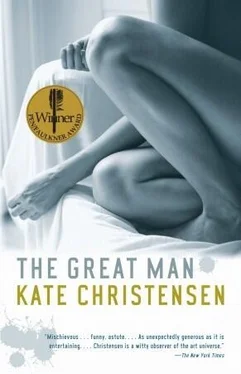“According to what my father told me about their arguments, Maxine always thought he was limited and stuck in his ways,” said Ruby to Ralph. “You can imagine how amicable their relationship was. She got a show at Leo Castelli’s gallery and Dad went ballistic and ranted all over our house, saying she wasn’t any good and she was just making a fool of herself. Do you come from a family of artists, Ralph?”
“No,” Ralph said, turning to Teddy, “my parents are both college professors, but I had the immense good fortune to be taken as a teenager by my uncle, who was a painter himself, to Oscar’s retrospective in 1991 at the Jewish Museum. I knew nothing about women then, but I felt I did after I saw Helena and Mercy —the society girl and the nightclub singer.”
“That retrospective was a strange time for Oscar,” said Teddy, amused at the thought of the teenaged Ralph beholding it. “Exciting, of course, but a retrospective implies encroaching obsolescence.”
“It was the contrast with Mercy that struck me at the time. That you could see into these two different women’s souls, the trapped bird in the debutante’s chest, the wild flame in the chanteuse’s eye — I had never been so moved before by the presence of greatness. Now, of course, I have seen many of his paintings, and I am never disappointed, not even by the sixties subway nudes, which I venture to say are among his riskiest, most out-there work…. Anyway, that adolescent experience I had of Mercy and Helena …” Ralph closed his eyes. “I went to art school after I graduated from college and studied painting, partially in hopes of one day meeting Oscar and writing his life. Then he died before I had the chance to talk to him.”
“I’m so sorry,” said Teddy. “I hope we can re-create him for you.”
Ralph blinked at her, flummoxed.
“This soup is incredible,” Ruby told Teddy.
“Inedible?”
“No! Incredible,” Ruby said, laughing. “Is there grated ginger in it?”
“Good guess, but no,” said Teddy, looking pointedly at Ralph, who was eating slowly and offhandedly, without noticing a single flavor, she would have bet. He struck her as a man made more of spirit and mind than of flesh, someone for whom bodily pleasure was a sometimes guilty and generally abstracted afterthought. It had long been Teddy’s theory that you could tell how someone was in bed by the way he or she ate; she was sure that Ralph would be ethereal and self-abnegating.
“A tiny bit of mace?” asked Ruby.
“Nope,” said Teddy again. “You’re way out on a limb.” It was a game she’d taught her daughters to play as children: guess the ingredients. She’d always put one secret thing into a dish to test them. Whoever guessed it got the satisfaction of her mother’s approbation.
The telephone rang. Ruby put her hand on Teddy’s to keep her from getting up, then answered it herself in the front hall.
“It’s me,” her twin sister said. Ruby heard squalling in the background. “Buster’s having a meltdown. I can’t make it to Mom’s. Can you tell her for me?”
“This is important,” said Ruby. “Dad’s biographer is here. Can’t Ivan take the kids for a couple of hours?”
“Ivan had to go into the lab today. Please tell Mom I’m sorry.”
“So bring the kids.”
“Ivan’s got the car,” said Samantha.
“So I’ll treat you to a cab.”
“The car seats are in the car; Ivan would kill me if I went anywhere with the kids without them. And I wouldn’t wish Buster on anyone right now. No one would get a word in.”
Ruby happened to know that Buster, a three-year-old boy whose given name was Peter, behaved with admirable civility in the care of his aunt and grandmother. She suspected that Samantha exacerbated rather than soothed Buster’s tantrums, and that, in fact, he threw these tantrums to distract Samantha’s attention from her husband, then kept them up when he figured out that as long as he acted horribly, he had her undivided attention. If Samantha hadn’t been so vapor-locked on Ivan, their son might have been calmer and better adjusted. But no one could tell Samantha anything: She often acted, Ruby thought, as if she were the first person on the planet to give birth to a human child, as if mothering were so sacred and rarefied, anyone who wasn’t a mother couldn’t possibly understand how profoundly it changed you. But Ruby guessed she had to act this way in order to make herself feel better about being in the thrall of a two-foot-tall manipulative, punitive tyrant and a small screaming bag of stinking humors who sucked her dry. Whenever Samantha described the amazingness of breast-feeding or the miracle of watching her child take his first shit on a potty, Ruby would think of the quiet little apartment she’d lived in alone for fifteen years. There was no greater joy she knew than going home alone to find everything as she’d left it, her bed, her books, her computer, her refrigerator, her bathtub, her solitary self.
“Sam,” she said, “come on. It won’t kill them to take a cab ride without car seats this one time.”
“Buster,” Samantha replied in a deadly, cold, even voice. “I think you need a time-out. Sorry, Rube, I gotta go. This little ape child needs to take some deep breaths.”
Ruby returned to the dining room. “Samantha has bagged out,” she said. “Peter’s apparently being a monster.”
“Peter,” said Teddy, “is never a monster. I’m very disappointed she won’t come.”
“She apologized,” said Ruby in a tone that conveyed what she thought of her sister’s apology. “I think she’s reluctant to talk to you, Ralph. She didn’t get along with Dad. She’s still mad at him.”
“Ruby,” said Teddy. Although she was older by only eight minutes, Ruby had always been much more assertive and mature, so naturally Teddy had been more protective of Samantha. As a mother, you played the cards you were dealt. “I don’t think Samantha would appreciate your revealing that.”
“Probably not,” Ruby admitted. “But it’s just so annoying.”
“By the way, Ralph, did you know you had competition?” Teddy asked him point-blank.
He swallowed his mouthful and looked at her.
“It’s true,” she said. “Another biographer is writing a book about Oscar; he interviewed me several days ago. Has no one told you?”
“No,” said Ralph. He lifted his napkin and wiped his lips.
“His name is Henry Burke. Maybe you know each other.”
“I have never heard his name before now,” said Ralph.
“Oh dear,” said Teddy, who was enjoying this a little. “I can see that this is bad news, and I’m sorry to have to be the one to tell you. He interviewed me just this week.”
“I haven’t spoken to him yet,” said Ruby. “Well, except on the phone. So I’m virgin territory, Ralph; he hasn’t gotten to me yet.”
Ralph tried to laugh through his consternation. “Does he…does he have a book contract, do you happen to know?”
“Yes,” said Teddy. “With Yale University Press.”
“My contract is with Norton,” said Ralph. “Does he know about me?”
“I haven’t told him,” said Teddy.
“Me, neither, obviously,” said Ruby. “But I bet Maxine will. She’ll love playing you both off against each other.”
“Oh, we all will,” said Teddy, laughing. “Why not? Two young men vying for Oscar like vultures over a dead hyena—”
Ralph laughed ruefully. This time, his laughter suited the scale of the joke.
“All right,” said Teddy, softening toward him a little now that she’d sprung bad news on him, “coffee, anyone? I’ve made a fresh blueberry cake. It’s still warm, and there’s ice cream.”
Читать дальше












